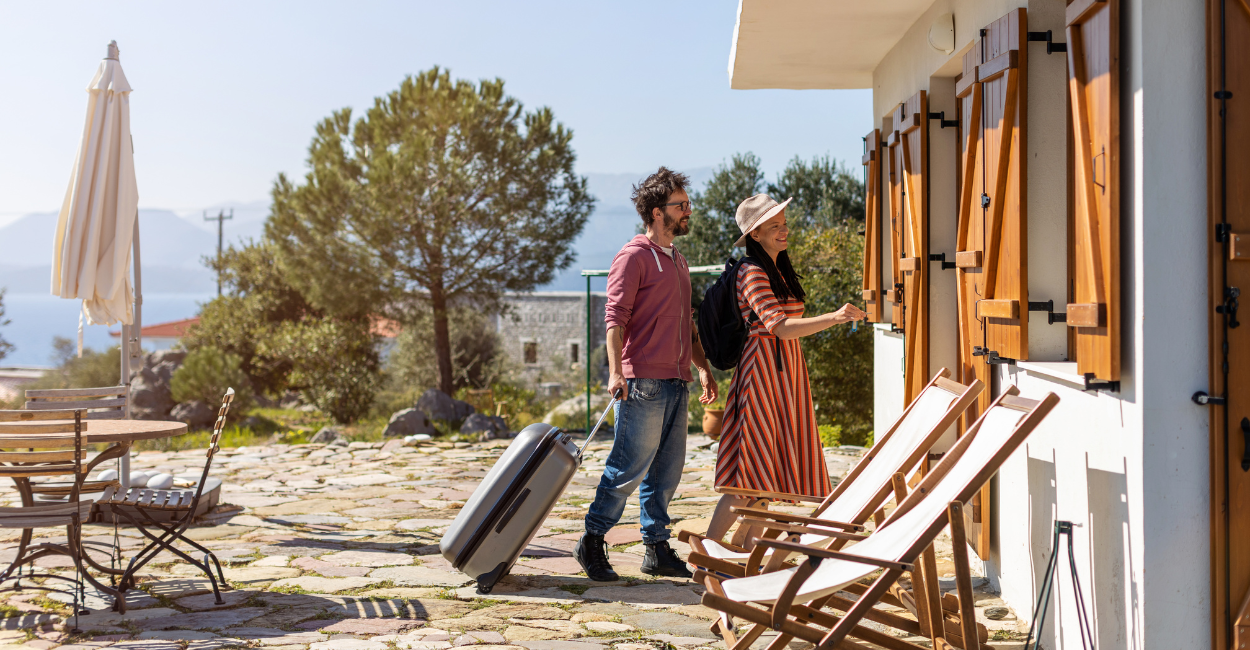Buying a house to rent out is an increasingly popular real estate investment strategy. In addition to traditional rentals with long-term contracts, many investors are interested in a different business: short-term rentals and vacation homes for tourists.
Buying a property for tourist rentals allows you to take advantage of the growing demand for flexible housing solutions, generating a steady stream of income. However, in order to maximize the value of your capital, it is essential to carefully choose the property to be used for short-term rentals or vacation homes, also based on the area, as well as to consider management costs and tax implications.
Investing in the real estate market requires in-depth knowledge of the sector and a targeted strategy. This segment has experienced strong growth, fueled by tourist demand and a preference for personalized stays.
This guide will help you choose the ideal property for short-term rentals, analyze management costs, consider taxes for vacation rentals, evaluate returns, and plan for efficient property management.

Why buying a house to rent is an attractive investment
Investing in a house to rent, especially through short-term rentals or vacation homes, is now a winning choice in the real estate market. Demand not only remains high but continues to grow, driven by the explosion of tourism and the preference for flexible and independent solutions.
According to the Eurostat report, in the third quarter of 2024, guests spent 366.2 million nights in short-term rentals booked through online platforms, an increase of +18% compared to the same period in 2023.
This trend confirms that more and more tourists prefer vacation rentals to traditional hotels.
In cities with high tourist appeal such as Milan, Rome, and Florence, demand remains very strong, while supply is still limited: in Milan, for example, only about 2% of real estate is dedicated to short-term rentals, leaving ample room for growth and opportunities for new investments.
The flexibility to adjust prices to the seasons—high or low—and to periods of peak demand allows for further optimization of economic returns compared to traditional rentals.

How to choose the right property for short-term rentals and vacation homes
Where to buy a home to rent to tourists
When deciding to buy a home to rent to tourists, one of the most common questions is: which location should you choose to invest in? The answer depends largely on the type of clientele you want to attract and your available budget.
Among the most popular tourist destinations are the seaside resorts of Puglia, such as Salento and Gargano, which offer beautiful beaches and still competitive prices.
Some areas of Liguria, such as Bordighera, are also attracting investors thanks to steadily growing tourist demand.
Tuscany, on the other hand, offers a unique mix: the charm of cities of art such as Florence, Lucca, and Siena is complemented by the countryside of Chianti and Maremma, and there is no shortage of beautiful seaside resorts such as Monte Argentario.
Here, vacation homes in small villages, close to nature destinations or the beach, are in high demand, especially among foreign tourists.
Take a look at our in-depth article on How to sell your home to foreigners: when and why to look for a buyer abroad.
For those who prefer the mountains, the Dolomites and resorts such as Madonna di Campiglio guarantee seasonal rentals that are in high demand both in winter and summer.
Finally, large urban centers such as Milan, Rome, and Florence represent an excellent opportunity for short-term rentals, thanks to the constant flow of tourists and cultural events that keep demand high throughout the year.
Interest is such that in some areas, local authorities are introducing regulations to control the number of short-term rentals, demonstrating the vitality and value of this market.
Choosing the right location therefore means carefully assessing seasonality, rental potential, accessibility, and the regulatory framework in force in the area.
Property type: what are travelers looking for?
Travelers who opt for short-term rentals or vacation homes are looking for comfortable and functional accommodation, but also features that make their stay enjoyable and hassle-free. Generally, they prefer houses or small independent apartments with a fully equipped kitchen, perhaps with outdoor spaces such as terraces or gardens.
The presence of Wi-Fi, air conditioning, and tasteful furnishings are now considered essential elements. In addition, location is a key factor: proximity to points of interest, public transportation, and services facilitates the choice of property by tourists, strongly influencing demand and the profitability of the investment.
Property condition, furnishings, and comfort
Another important aspect when evaluating a property for short-term rentals is its condition and layout. The most frequently asked question is: should you buy a furnished home or one that needs renovating for short-term rentals? The answer varies depending on your budget and the time you have available.
A house that is already furnished and in good condition allows you to enter the short-term rental market more quickly, reducing start-up times and costs. However, buying a property to renovate can be an opportunity to customize the spaces according to the specific needs of the tourist market, thus increasing the value of the property and its appeal.
In any case, it is essential to focus on comfort, such as good thermal insulation, modern systems, and functional and welcoming furnishings, elements that positively influence reviews and booking frequency.

Market and competition analysis
What is the market demand in the area where you want to buy?
Before investing in buying a house for short rentals or as a holiday home it is essential to analyze the market demand in the chosen area. Demand can vary significantly from location to location and depends on factors such as the tourist season, the presence of recall events and the general attractiveness of the place.
For example, cities as Milan have recorded woodpeckers of question during international events, with an increase up to 316 % in some areas during concerts or great manifestations, accompanied by middle rates for 139 Euro to night (source: Finanza.com).
These data highlight the importance of assessing demand also in relation to external and temporary factors, in order to determine whether the investment can ensure a constant flow of short rents or holiday homes.
Know your competitors
Another important aspect is knowing the competition in the short-term rental market in your area of interest. Too much supply, without a corresponding increase in demand, can lower occupancy rates and reduce rental prices.
In some cities, such as Rome, the increase in luxury hotels and accommodation facilities has generated strong competition with short-term rentals, causing occupancy to fall from 78% to 70% in the first months of 2025.
Analyzing your competitors means studying the type of property, the services offered, the rates charged, and the reviews received from guests. This analysis allows you to better position your property on the market and identify any niches or strengths to leverage to attract more customers.
In addition, it is essential to consider new industry regulations, such as the mandatory introduction of the National Identification Code (CIN) from January 2025, which ensures greater transparency and allows for better monitoring of shortterm rentals.

Costs and taxes for those buying a home to rent out
Is it worth buying a home for short-term rentals? This is a question that many potential investors ask themselves.
The answer depends on the relationship between management costs, specific taxes for vacation homes, and the potential return on the property. To be a profitable investment, a short-term rental home should guarantee a gross annual return of at least 4% to 5% of the purchase value, taking into account the costs of managing short-term rentals and taxes.
Areas with high tourist demand offer greater opportunities to achieve this goal, while in other areas the market may be less profitable, especially when considering fixed costs such as property tax, utilities, and maintenance.
Initial costs, mortgage, and renovation
Buying a home to rent out involves initial costs such as registration, cadastral, and mortgage taxes, in addition to notary fees.
If you take out a mortgage, you should consider the interest rate and the duration of the loan, factors that affect the sustainability of the investment.
In addition, vacation homes often require renovation work to bring them up to the standards required for short-term rentals, with costs that can vary greatly depending on the condition of the property.
It is therefore essential to budget for this work to avoid surprises and ensure a good level of comfort for future guests.
Tax regime: flat tax, IRES/IRPEF, and local taxes
Anyone deciding to buy a house to rent out must carefully evaluate the applicable tax regime.
For short-term rentals, there is the option of opting for a flat tax of 21%, which simplifies taxation and can be more convenient than ordinary IRPEF.
If the income is managed through a company, IRES applies instead. In addition, local taxes such as IMU and TARI must be taken into account, which are also payable on second homes used as vacation homes and can significantly affect the maintenance costs of the property.
Management costs and specific taxes
In addition to taxes and renovation costs, it is important to consider the management costs associated with short-term rentals: cleaning and sanitization expenses
between guests, booking platform commissions, key management and reception costs, utilities, and routine maintenance.
These items can represent a significant expense and require careful planning to ensure the economic sustainability of the investment.
Finally, it is worth remembering that current legislation provides for specific taxes on vacation homes, which vary depending on the municipality, so it is always advisable to check with local authorities before purchasing the property.

Calculating return and profitability for short-term rentals and vacation homes
What is the average return on a vacation home? In Italy, the average gross return on a vacation home is generally between 6% and 9% of the property value, depending on the location and quality (source: Milanofinanza.it).
In particularly buoyant markets or those with optimal tourist rental management, this figure can reach peaks of 10%. It is important to remember that these figures depend on many variables, including seasonality, tourist demand, and management costs associated with short-term rentals.
Setting an appropriate purchase price
To maximize profitability, it is essential to start with the right purchase price. The property should not be paid for at a price that is too high compared to the local market, otherwise the return could be drastically reduced.
It is advisable to carry out a comparative analysis of real estate prices in the chosen areas, also considering the prospects for appreciation in the medium to long term.
A well-considered purchase, preferably in locations with good tourist demand and growth potential, facilitates the achievement of a positive balance between costs and revenues generated by short-term rentals or vacation homes. Read the guide to consulting OMI prices.
Cash flow forecasting and ROI calculation
Once the purchase price has been determined, it is important to forecast the cash flows from the rental activity. This includes estimated rental income, minus management expenses (cleaning, maintenance, utilities, taxes) and any financial expenses, such as a mortgage.
For example, let’s say you buy a vacation home for €200,000. If you plan to rent it out for €1,000 per month for 8 months of the year, you will have gross annual income of €8,000. From this figure, you must subtract expenses: cleaning and maintenance (estimated at €1,200), utilities (approximately €600), taxes and insurance (approximately €800), and mortgage payments (let’s assume €3,000). In this case, the total expenses amount to €5,600, so the net annual income will be €2,400.
ROI (Return On Investment) is calculated by comparing the annual net income with the capital invested, thus providing a clear picture of the property’s profitability.
In our example, the ROI would be €2,400 divided by €200,000, or 1.2%. This value helps you understand whether the investment is attractive compared to other opportunities.
It is also important to include periods of vacancy, i.e., times when the property is not rented, to avoid overestimating the actual return.
If, for example, the house remains vacant for two months a year, the gross income drops to €6,000 and the ROI is further reduced.
Proper financial planning allows you to assess whether investing in a vacation home is sustainable and cost-effective in the medium term.

Investment strategies for short-term rentals and vacation homes
Preliminary check
Before purchasing a property for short-term rentals or vacation homes, it is essential to carefully check local laws and regulations. Each municipality may have specific provisions regarding the intended use of properties, limits on tourist rentals, and the requirements necessary to operate legally.
Recently, increasingly strict national regulations and growing control over the short-term rental market have been introduced, which must be complied with not only to ensure the regularity of the activity but also to avoid heavy administrative penalties, fines, or even the suspension of the rental activity.
For example, in many Italian cities, limits have been introduced on the number of days a vacation home can be rented, the obligation to register with the municipality or notify the public safety authorities, and sometimes the need to obtain specific licenses or permits.
In addition, there may be urban planning restrictions that prohibit unauthorized alterations or modifications to the property, or restrictions on the type of contract to be used.
Carrying out a thorough preliminary check, perhaps with the help of professionals such as surveyors, lawyers, or specialized real estate consultants, allows you to fully understand the regulatory framework, avoid unpleasant surprises, and plan your investment safely and in compliance with the law.
Knowing and complying with local regulations is the first step towards a sustainable and smooth investment in the vacation home and short-term rental market.
Prepare a seasonal pricing plan and dynamic rates
A winning strategy for maximizing short-term rental returns is to define a seasonal pricing plan that takes into account variations in demand throughout the year. Rates should be adjusted dynamically, increasing during peak seasons, holidays, and local events, and decreasing during low season months to maintain a good occupancy rate.
The use of dynamic pricing software can facilitate this management, optimizing revenues based on the market and competition.
Marketing and booking channels
To successfully rent out a vacation home, it is essential to focus on marketing and choose the right booking channels. In addition to the most popular platforms, it is useful to consider direct channels such as a dedicated website or partnerships with local tourist agencies.
High-quality photos, detailed descriptions, and positive reviews are key elements in attracting guests and increasing the visibility of the property online.
Operational management
Operational management is a fundamental aspect of ensuring a positive guest experience and obtaining excellent reviews. This includes organizing cleaning and sanitization between check-out and the next check-in, key management, and guest reception.
Providing timely customer service and responding quickly to requests or problems helps build customer loyalty and maintain high occupancy rates.
Alternatively, you can rely on specialized companies that take care of all these aspects, lightening the management load and ensuring professionalism.

Financing strategies for purchasing a vacation home
Purchasing a vacation home for short-term rentals requires a solid financing strategy that supports both the purchase and any renovation or modernization work.
In 2025, there are several subsidies and financing tools available specifically designed for those who want to invest in the tourism and vacation home sector.
One of the most interesting opportunities is the non-repayable grants and subsidized loans offered at regional, national, and European level.
For example, many Italian regions periodically open calls for proposals that cover up to 100% of eligible expenses. These funds can be divided between nonrepayable grants and low-interest loans, intended for businesses and professionals who are active or intend to start a business in the tourism sector.
These grants can be used to cover renovation costs, equipment purchases, digitization, and other investments necessary to start a vacation rental business.
In addition, there are national programs managed by entities such as Invitalia or the Ministry of Enterprise and Made in Italy, which offer zero-interest loans and non-repayable grants for young entrepreneurs or disadvantaged groups interested in starting hospitality businesses. These tools are particularly useful for those who want to buy a house and turn it into a short-term rental business without having to immediately face large capital outlays.
To access these benefits, it is essential to prepare a detailed business plan that highlights the sustainability of the investment and the potential economic return. It is also advisable to check with regional and municipal offices or institutional portals dedicated to incentives for vacation homes in order to identify the call for proposals or measure that best suits your needs.
As an alternative to subsidized loans, you can take out a traditional mortgage. In this case, it is important to carefully evaluate the interest rate and choose an amortization plan that allows you to sustain the financial burden without compromising the profitability of the investment. Often, a combination of a mortgage and public subsidies is the ideal solution for purchasing a home to rent as a vacation home.

How to manage a property for short-term rentals or as a vacation home
Choosing between direct management and specialized agencies
There are two main ways to manage a property intended for short-term rentals or as a vacation home: independently or by relying on a specialized agency. Direct management allows you to have complete control over the property and guest relations, but it requires time, expertise, and constant availability to manage bookings, check-ins/check-outs, cleaning, and customer service.
On the other hand, entrusting the management to specialized companies offers the advantage of a professional service that takes care of every detail, from promoting the property to daily operations, relieving the owner of most of the operational commitments.
Marketing and promotion of the property to maximize occupancy
To increase the occupancy and return on investment of a vacation rental, it is essential to invest in an effective marketing strategy. This includes creating appealing listings with professional photographs, detailed and up-to-date descriptions, as well as a presence on multiple booking channels.
Careful management of your online reputation, through quick responses to reviews and timely customer service, helps to retain guests and attract new ones.
Promoting seasonal or last-minute offers and using dynamic pricing also helps to maintain high occupancy rates even during the low season.

Buying a home for short-term rentals or as a vacation home can be a solid and profitable investment, provided you choose the property carefully, accurately assess costs and taxes, and manage the business effectively.
Whether you already own a property or are thinking of buying one, it is essential to analyze the potential return and market conditions to get the maximum financial return.
To help you along the way, Hasamia offers a comprehensive real estate consulting service that guides you in purchasing the ideal home for short-term rentals or vacation homes.
Thanks to our innovative online real estate agency model, you can easily access a large database of selected and constantly updated properties, with listings available throughout Italy. This will allow you to easily find the home that best suits your needs and budget, even if you want to invest in vacation homes under €100,000.
With Hasamia, buying a home to rent becomes a simple, transparent experience guided by experienced professionals who will support you at every stage of your investment.
Send us a detailed request to let us know exactly what you are looking for: our team will be happy to help you make your real estate investment a reality.





